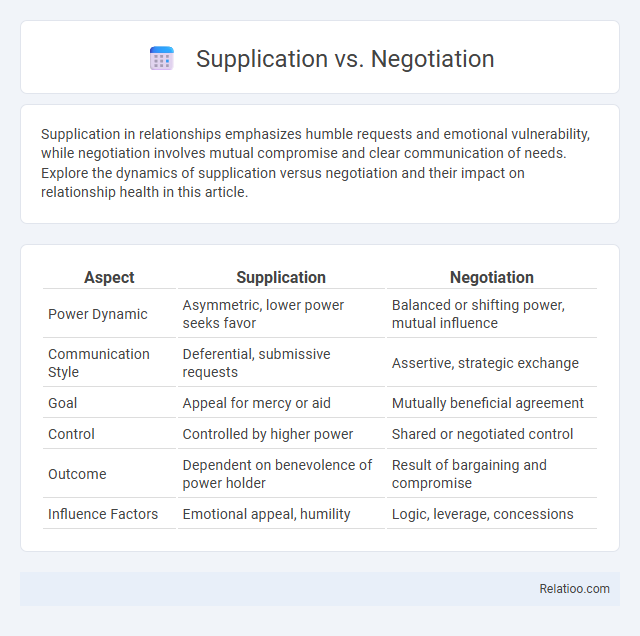Supplication in relationships emphasizes humble requests and emotional vulnerability, while negotiation involves mutual compromise and clear communication of needs. Explore the dynamics of supplication versus negotiation and their impact on relationship health in this article.
Table of Comparison
| Aspect | Supplication | Negotiation |
|---|---|---|
| Power Dynamic | Asymmetric, lower power seeks favor | Balanced or shifting power, mutual influence |
| Communication Style | Deferential, submissive requests | Assertive, strategic exchange |
| Goal | Appeal for mercy or aid | Mutually beneficial agreement |
| Control | Controlled by higher power | Shared or negotiated control |
| Outcome | Dependent on benevolence of power holder | Result of bargaining and compromise |
| Influence Factors | Emotional appeal, humility | Logic, leverage, concessions |
Understanding Supplication: Definition and Context
Supplication is a heartfelt request or plea made with humility, often directed toward a higher power for guidance or assistance, distinguishing it from negotiation, which involves a mutual exchange or compromise between parties. Understanding supplication requires recognizing its spiritual or emotional context, where the supplicant expresses dependence rather than seeking to influence through bargaining. Your awareness of supplication's purpose can deepen your appreciation of its role in personal and religious practices, highlighting sincerity over transactional interaction.
Negotiation Explained: Key Principles
Negotiation is a strategic communication process aimed at reaching a mutually beneficial agreement through dialogue and compromise, contrasting with supplication, which involves requesting help passively. Key principles of negotiation include preparation, understanding interests and priorities, effective communication, and seeking win-win solutions that address both parties' needs. Mastering these elements empowers you to navigate conflicts and optimize outcomes in personal and professional scenarios.
Core Differences Between Supplication and Negotiation
Supplication involves asking earnestly for something with humility, often without expecting any exchange, whereas negotiation is a strategic dialogue where both parties seek a mutually beneficial agreement through compromise and bargaining. Unlike supplication, negotiation relies on power dynamics and leverage to influence outcomes, making it more interactive and transactional. Your approach should reflect these core differences, choosing supplication when seeking grace or favor and negotiation when aiming for a balanced deal.
Psychological Foundations of Supplication
Supplication, unlike negotiation which involves reciprocal communication and bargaining, is a form of humble pleading characterized by sincere vulnerability, often grounded in the psychological need for acceptance and support. The psychological foundations of supplication highlight its role in signaling dependency and eliciting empathy, as individuals express submission to gain social or emotional aid. Your understanding of these dynamics can enhance interpersonal relationships by recognizing when supplication reflects genuine need rather than strategic manipulation.
Power Dynamics in Negotiation Processes
Negotiation involves a balance of power where parties engage in reciprocal communication to reach mutual agreements, whereas supplication is characterized by a power imbalance where one party requests concessions without reciprocation, often from a position of weakness. In negotiation processes, power dynamics influence how demands, offers, and compromises are structured, with negotiators leveraging resources, authority, or information to enhance their position. Understanding these distinctions helps clarify how power asymmetries impact bargaining strategies and decision-making outcomes in both cooperative and adversarial contexts.
When to Use Supplication vs Negotiation
Supplication is appropriate when You need to express humility or request help from a higher authority, often in personal or spiritual contexts, emphasizing dependence rather than bargaining. Negotiation is best utilized in situations where mutual interests are involved, aiming for a compromise or agreement through dialogue and strategic exchange. Understanding when to use supplication versus negotiation helps You choose between seeking grace or engaging in collaborative problem-solving.
Cultural Influences on Persuasion Tactics
Cultural influences significantly shape the effectiveness of supplication, negotiation, and supplication as persuasion tactics, with collectivist societies favoring supplication through emotional appeals and communal harmony. Negotiation thrives in cultures valuing direct communication and individualism, emphasizing logical arguments and mutual benefit. Understanding cultural context is crucial for tailoring persuasion strategies to enhance receptivity and achieve desired outcomes across diverse populations.
Impact of Communication Styles on Outcomes
Supplication, characterized by humble requests and appeals for help, often fosters empathy but may risk perceived weakness, affecting negotiation leverage and outcomes. Negotiation relies on assertive communication, balancing cooperation and competition to achieve mutually beneficial agreements, directly impacting contract success and relationship maintenance. Integrating supplication within negotiation can enhance trust and openness, yet overreliance might undermine authority and reduce effectiveness in high-stakes decision-making contexts.
Common Pitfalls in Supplication and Negotiation
Common pitfalls in supplication include unrealistic expectations and lack of sincere intent, which can hinder effective communication with a higher power. In negotiation, common mistakes are poor preparation, failure to understand the other party's interests, and ineffective communication, leading to suboptimal agreements. Awareness of these challenges helps individuals approach supplication with genuine humility and negotiation with strategic clarity.
Best Practices for Effective Decision-Making
Effective decision-making involves understanding the distinct roles of supplication, negotiation, and consultation. Supplication requires clearly articulating needs and constraints, while negotiation emphasizes finding mutually beneficial solutions through active listening and compromise. Consultation engages relevant stakeholders to gather diverse perspectives, ensuring decisions are well-informed and aligned with organizational goals.

Infographic: Supplication vs Negotiation
 relatioo.com
relatioo.com